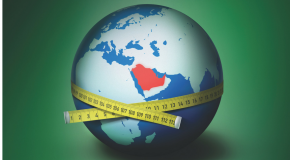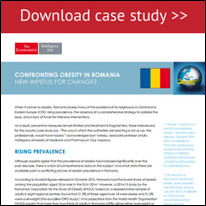Healthcare perspectives from The Economist Intelligence Unit
Developing countries are ill-equipped to manage the growing chronic-disease burden
Related content

Confronting obesity in the Middle East: Cultural, social and policy challen...
This report is based on five in-depth interviews with senior obesity experts from the region, complemented by extensive desk research. The main findings of the research are as follows:
The prevelance of obesity in the region is among the highest in the world. High levels of obesity in the region are the result of a complex combination of interconnected environmetal, cultural, and biological causes. Obesity is a mejor economic burden on countries in the region. A widespread public perception in the region is that obesity is a symptom of diabetes or hypertension, rather than a disease in itself.
Mental health and integration
Mental illness is the second largest contributor to years lost due to disability (YLDs) in the Asia-Pacific region. Nowhere, though, do more than half of those affected receive any medical treatment. This is not some temporary crisis. It is business as usual.
Across the region, policy makers and health systems are taking note. In 2010, Japan declared mental illness to be one of just five priority diseases; China passed its first ever mental health law in 2012; Indonesia significantly modernised its legislation in 2014 and India adopted its first mental health policy the same year. Meanwhile, at the international level, APEC and ASEAN have also begun to engage with the issue.
How to quantify investment in health leaders
Related content

Building Africa's healthcare leadership capacity
The main reason for Africa's weak healthcare systems is neither a shortage of policies, nor road maps, nor even funding. Lack of leadership capacity, reflected in corruption and flawed policy implementation, must be addressed, argues Dr Margaret Mungherera, immediate past president of the World Medical Association.
Since 1990 the Millennium Development Goals (MDGs) have galvanised the world into action. There is substantial evidence showing remarkable improvement in the health of populations, with many countries experiencing a dramatic increase in life expectancy. However, the positive developments are not equally distributed throughout the world. Only a handful of African countries have achieved one of the three health-related MDGs, concerning the reduction of child mortality, improving maternal health, and combating HIV/AIDS, malaria and other diseases. The majority of African countries can probably only expect to meet any of the MDGs after 2050—at least 35 years after the target year of 2015.
Moreover, the African continent continues to suffer from a disease burden that is disproportionate to its population. For instance, despite having just 11% of the global population, Africa has 45% of the world's women dying from childbirth-related complications and 62% of the world's HIV/AIDS patients. This huge disease burden can largely be attributed to weak health systems.
African governments have responded to this challenge by ratifying several international and regional declarations, with a number of countries further incorporating national policies and Health Sector Strategic Plans (HSSPs) into national development plans. Subsequently, significant funds from domestic and foreign sources have been pumped into African healthcare sectors for the purpose of implementing these policies. Unfortunately, it is estimated that 20-40% of these funds are wasted, largely because of endemic corruption and flawed implementation that is not in line with policy.
The importance of capacity building
Africa's health systems have a plethora of stakeholders in the public, private and civil-society sectors, each with specific leadership roles to play. Unfortunately, they have failed to fulfill these, largely because they lack the capability. Developing leadership capacity should therefore be the main emphasis of any effort aiming to reduce Africa’s disease burden. It is for this reason that the World Medical Association has embarked on an initiative designed to strengthen the leadership role of African national medical associations in order to enable them to play a more effective part in strengthening the health systems of their countries.
It is unfortunate that it has taken the recent outbreak of Ebola for the world to realise that it is the weakness of African health systems that is the biggest threat to global health. We must hope that it will not take a greater crisis, or many more deaths—African or other—before the world understands that the key solution to strengthening these systems lies in effective leadership from within Africa rather than from outside the continent.
More views on the future of healthcare in Africa can be found in a new report, "The future of healthcare in Africa: progress on five healthcare scenarios", written by The Economist Intelligence Unit and sponsored by Janssen. The outlook for healthcare in Africa will also be discussed at an upcoming conference, Health Care in Africa 2014: fast-tracking to the future.
The views and opinions expressed in this article are those of the authors and do not necessarily reflect the views of The Economist Intelligence Unit Limited (EIU) or any other member of The Economist Group. The Economist Group (including the EIU) cannot accept any responsibility or liability for reliance by any person on this article or any of the information, opinions or conclusions set out in the article.

The future of healthcare in Africa
"The future of healthcare in Africa: progress, challenges and opportunities", a report written by The Economist Intelligence Unit (EIU) and sponsored by Janssen, explores Africa's recent progress on several major healthcare challenges. In the first chapter the report looks at progress on five future scenarios for healthcare in Africa: an increasing focus on primary and preventive care; empowerment of communities; universal healthcare; telemedicine; and the role of international donors. The second chapter includes the views on these challenges from the perspectives of five healthcare professionals and leaders in Africa.
There are encouraging signs that all stakeholders are taking a broader view of Africa’s healthcare challenges and focusing on how to work more closely together in order to get better value from their healthcare investments and to improve healthcare quality.

Value-based healthcare in Sweden: Reaching the next level
The need to get better value from healthcare investment has never been more important as ageing populations and increasing numbers of people with multiple chronic conditions force governments to make limited financial resources go further.
These pressures, along with a greater focus on patient-centred care, have raised the profile of VBHC, especially in European healthcare systems. Sweden, with its highly comprehensive and egalitarian healthcare system, has been a leader in implementing VBHC from the beginning, a fact that was underscored in a 2016 global assessment of VBHC published by The Economist Intelligence Unit.
This paper looks at the ways in which Sweden has implemented VBHC, the areas in which it has faced obstacles and the lessons that it can teach other countries and health systems looking to improve the value of their own healthcare investments.
Encouraging policy action to address the psoriasis challenge
This report examines how health systems in Europe and Canada are responding to the World Health Organisation’s support for worldwide action against psoriasis, an autoimmune disease. The findings of this report are based on research by The Economist Intelligence Unit and include insights from leading psoriasis experts in academia and the medical profession as well as patients and patient association leaders.
More from this series

white paper
Encouraging policy action to address the psoriasis challenge
This report examines how health systems in Europe and Canada are responding to the World Health Organisation’s support

infographic
Encouraging policy action to address the psoriasis challenge
Related content

Value-based healthcare in Sweden: Reaching the next level
The need to get better value from healthcare investment has never been more important as ageing populations and increasing numbers of people with multiple chronic conditions force governments to make limited financial resources go further.
These pressures, along with a greater focus on patient-centred care, have raised the profile of VBHC, especially in European healthcare systems. Sweden, with its highly comprehensive and egalitarian healthcare system, has been a leader in implementing VBHC from the beginning, a fact that was underscored in a 2016 global assessment of VBHC published by The Economist Intelligence Unit.
This paper looks at the ways in which Sweden has implemented VBHC, the areas in which it has faced obstacles and the lessons that it can teach other countries and health systems looking to improve the value of their own healthcare investments.

Breast cancer patients and survivors in the Asia-Pacific workforce
With more older women also working, how will the rising trend of breast cancer survivorship manifest in workplace policies, practices and culture? What challenges do breast cancer survivors face when trying to reintegrate into the workforce, or to continue working during treatment? How can governments, companies and society at large play a constructive role?
This series of reports looks at the situation for breast cancer survivors in Australia, New Zealand and South Korea. It finds that while progress has been made, more needs to be done, particularly in South Korea, where public stigma around cancer remains high.
The Cost of Silence
Cardiovascular diseases levy a substantial financial toll on individuals, their households and the public finances. These include the costs of hospital treatment, long-term disease management and recurring incidence of heart attacks and stroke. They also include the costs of functional impairment and knock-on costs as families may lose breadwinners or have to withdraw other family members from the workforce to care for a CVD patient. Governments also lose tax revenue due to early retirement and mortality, and can be forced to reallocate public finances from other budgets to maintain an accessible healthcare system in the face of rising costs.
As such, there is a need for more awareness of the ways in which people should actively work to reduce their CVD risk. There is also a need for more primary and secondary preventative support from health agencies, policymakers and nongovernmental groups.
To inform the decisions and strategies of these stakeholders, The Economist Intelligence Unit and EIU Healthcare, its healthcare subsidiary, have conducted a study of the prevalence and costs of the top four modifiable risk factors that contribute to CVDs across the Asian markets of China, Australia, Hong Kong, Japan, Singapore, South Korea, Taiwan and Thailand.
Download the report to learn more.
Related content

Value-based healthcare in Sweden: Reaching the next level
The need to get better value from healthcare investment has never been more important as ageing populations and increasing numbers of people with multiple chronic conditions force governments to make limited financial resources go further.
These pressures, along with a greater focus on patient-centred care, have raised the profile of VBHC, especially in European healthcare systems. Sweden, with its highly comprehensive and egalitarian healthcare system, has been a leader in implementing VBHC from the beginning, a fact that was underscored in a 2016 global assessment of VBHC published by The Economist Intelligence Unit.
This paper looks at the ways in which Sweden has implemented VBHC, the areas in which it has faced obstacles and the lessons that it can teach other countries and health systems looking to improve the value of their own healthcare investments.

Breast cancer patients and survivors in the Asia-Pacific workforce
With more older women also working, how will the rising trend of breast cancer survivorship manifest in workplace policies, practices and culture? What challenges do breast cancer survivors face when trying to reintegrate into the workforce, or to continue working during treatment? How can governments, companies and society at large play a constructive role?
This series of reports looks at the situation for breast cancer survivors in Australia, New Zealand and South Korea. It finds that while progress has been made, more needs to be done, particularly in South Korea, where public stigma around cancer remains high.
The Cost of Silence
Cardiovascular diseases levy a substantial financial toll on individuals, their households and the public finances. These include the costs of hospital treatment, long-term disease management and recurring incidence of heart attacks and stroke. They also include the costs of functional impairment and knock-on costs as families may lose breadwinners or have to withdraw other family members from the workforce to care for a CVD patient. Governments also lose tax revenue due to early retirement and mortality, and can be forced to reallocate public finances from other budgets to maintain an accessible healthcare system in the face of rising costs.
As such, there is a need for more awareness of the ways in which people should actively work to reduce their CVD risk. There is also a need for more primary and secondary preventative support from health agencies, policymakers and nongovernmental groups.
To inform the decisions and strategies of these stakeholders, The Economist Intelligence Unit and EIU Healthcare, its healthcare subsidiary, have conducted a study of the prevalence and costs of the top four modifiable risk factors that contribute to CVDs across the Asian markets of China, Australia, Hong Kong, Japan, Singapore, South Korea, Taiwan and Thailand.
Download the report to learn more.
Encouraging policy action to address the psoriasis challenge
This report examines how health systems in Europe and Canada are responding to the World Health Organisation’s support for worldwide action against psoriasis, an autoimmune disease. The findings of this report, commissioned by Eli Lilly and Company, are based on research by The Economist Intelligence Unit and include insights from leading psoriasis experts in academia and the medical profession as well as patients and patient association leaders.
Related content

Value-based healthcare in Sweden: Reaching the next level
The need to get better value from healthcare investment has never been more important as ageing populations and increasing numbers of people with multiple chronic conditions force governments to make limited financial resources go further.
These pressures, along with a greater focus on patient-centred care, have raised the profile of VBHC, especially in European healthcare systems. Sweden, with its highly comprehensive and egalitarian healthcare system, has been a leader in implementing VBHC from the beginning, a fact that was underscored in a 2016 global assessment of VBHC published by The Economist Intelligence Unit.
This paper looks at the ways in which Sweden has implemented VBHC, the areas in which it has faced obstacles and the lessons that it can teach other countries and health systems looking to improve the value of their own healthcare investments.

Breast cancer patients and survivors in the Asia-Pacific workforce
With more older women also working, how will the rising trend of breast cancer survivorship manifest in workplace policies, practices and culture? What challenges do breast cancer survivors face when trying to reintegrate into the workforce, or to continue working during treatment? How can governments, companies and society at large play a constructive role?
This series of reports looks at the situation for breast cancer survivors in Australia, New Zealand and South Korea. It finds that while progress has been made, more needs to be done, particularly in South Korea, where public stigma around cancer remains high.
The Cost of Silence
Cardiovascular diseases levy a substantial financial toll on individuals, their households and the public finances. These include the costs of hospital treatment, long-term disease management and recurring incidence of heart attacks and stroke. They also include the costs of functional impairment and knock-on costs as families may lose breadwinners or have to withdraw other family members from the workforce to care for a CVD patient. Governments also lose tax revenue due to early retirement and mortality, and can be forced to reallocate public finances from other budgets to maintain an accessible healthcare system in the face of rising costs.
As such, there is a need for more awareness of the ways in which people should actively work to reduce their CVD risk. There is also a need for more primary and secondary preventative support from health agencies, policymakers and nongovernmental groups.
To inform the decisions and strategies of these stakeholders, The Economist Intelligence Unit and EIU Healthcare, its healthcare subsidiary, have conducted a study of the prevalence and costs of the top four modifiable risk factors that contribute to CVDs across the Asian markets of China, Australia, Hong Kong, Japan, Singapore, South Korea, Taiwan and Thailand.
Download the report to learn more.
Confronting obesity in Kuwait
Kuwait lies near the epicentre of the global obesity crisis. The Gulf region has some of the highest obesity levels in the world, and Kuwait and neighbouring Qatar have alternately topped the regional table.
Related content

Confronting obesity in the Middle East: Cultural, social and policy challen...
This report is based on five in-depth interviews with senior obesity experts from the region, complemented by extensive desk research. The main findings of the research are as follows:
The prevelance of obesity in the region is among the highest in the world. High levels of obesity in the region are the result of a complex combination of interconnected environmetal, cultural, and biological causes. Obesity is a mejor economic burden on countries in the region. A widespread public perception in the region is that obesity is a symptom of diabetes or hypertension, rather than a disease in itself.
Confronting obesity in the United Arab Emirates
Although the United Arab Emirates (UAE) has managed to defeat many of the infectious diseases that still affect other parts of the region, obesity and associated non-communicable diseases (NCDs) remain a major issue.

Confronting obesity in Europe: Taking action to change the default setting
Yet policymakers appear divided over how to confront the continent’s weight issue; some campaigners say policymakers are failing to recognise the scope of the problem.
In this report, we look at the current national and EU-level approaches to obesity policy, identify the weaknesses in current efforts, and discuss how strategies might be adapted to confront the scale of the obesity problem more effectively.
Read case studies:
Belgium | The Netherlands | The UK | France | Germany | Spain | Denmark | Sweden
Confronting obesity in Jordan
The Kingdom of Jordan, which is increasingly becoming a medical-tourism destination for metabolic surgery, is contending with its own obesity problem at home.
Related content

Value-based healthcare in Sweden: Reaching the next level
The need to get better value from healthcare investment has never been more important as ageing populations and increasing numbers of people with multiple chronic conditions force governments to make limited financial resources go further.
These pressures, along with a greater focus on patient-centred care, have raised the profile of VBHC, especially in European healthcare systems. Sweden, with its highly comprehensive and egalitarian healthcare system, has been a leader in implementing VBHC from the beginning, a fact that was underscored in a 2016 global assessment of VBHC published by The Economist Intelligence Unit.
This paper looks at the ways in which Sweden has implemented VBHC, the areas in which it has faced obstacles and the lessons that it can teach other countries and health systems looking to improve the value of their own healthcare investments.

Breast cancer patients and survivors in the Asia-Pacific workforce
With more older women also working, how will the rising trend of breast cancer survivorship manifest in workplace policies, practices and culture? What challenges do breast cancer survivors face when trying to reintegrate into the workforce, or to continue working during treatment? How can governments, companies and society at large play a constructive role?
This series of reports looks at the situation for breast cancer survivors in Australia, New Zealand and South Korea. It finds that while progress has been made, more needs to be done, particularly in South Korea, where public stigma around cancer remains high.
The Cost of Silence
Cardiovascular diseases levy a substantial financial toll on individuals, their households and the public finances. These include the costs of hospital treatment, long-term disease management and recurring incidence of heart attacks and stroke. They also include the costs of functional impairment and knock-on costs as families may lose breadwinners or have to withdraw other family members from the workforce to care for a CVD patient. Governments also lose tax revenue due to early retirement and mortality, and can be forced to reallocate public finances from other budgets to maintain an accessible healthcare system in the face of rising costs.
As such, there is a need for more awareness of the ways in which people should actively work to reduce their CVD risk. There is also a need for more primary and secondary preventative support from health agencies, policymakers and nongovernmental groups.
To inform the decisions and strategies of these stakeholders, The Economist Intelligence Unit and EIU Healthcare, its healthcare subsidiary, have conducted a study of the prevalence and costs of the top four modifiable risk factors that contribute to CVDs across the Asian markets of China, Australia, Hong Kong, Japan, Singapore, South Korea, Taiwan and Thailand.
Download the report to learn more.
Confronting obesity in Saudi Arabia
Saudi Arabia finds itself at the centre of a public-health crisis that has made the Arabian Gulf region an outlier among developed countries. The region has some of the highest levels of obesity in the world. In countries such as Saudi Arabia—where oil wealth led to dramatic changes in lifestyle earlier than in other Gulf states such as Oman—the crisis is especially acute.
Related content

Value-based healthcare in Sweden: Reaching the next level
The need to get better value from healthcare investment has never been more important as ageing populations and increasing numbers of people with multiple chronic conditions force governments to make limited financial resources go further.
These pressures, along with a greater focus on patient-centred care, have raised the profile of VBHC, especially in European healthcare systems. Sweden, with its highly comprehensive and egalitarian healthcare system, has been a leader in implementing VBHC from the beginning, a fact that was underscored in a 2016 global assessment of VBHC published by The Economist Intelligence Unit.
This paper looks at the ways in which Sweden has implemented VBHC, the areas in which it has faced obstacles and the lessons that it can teach other countries and health systems looking to improve the value of their own healthcare investments.

Breast cancer patients and survivors in the Asia-Pacific workforce
With more older women also working, how will the rising trend of breast cancer survivorship manifest in workplace policies, practices and culture? What challenges do breast cancer survivors face when trying to reintegrate into the workforce, or to continue working during treatment? How can governments, companies and society at large play a constructive role?
This series of reports looks at the situation for breast cancer survivors in Australia, New Zealand and South Korea. It finds that while progress has been made, more needs to be done, particularly in South Korea, where public stigma around cancer remains high.
The Cost of Silence
Cardiovascular diseases levy a substantial financial toll on individuals, their households and the public finances. These include the costs of hospital treatment, long-term disease management and recurring incidence of heart attacks and stroke. They also include the costs of functional impairment and knock-on costs as families may lose breadwinners or have to withdraw other family members from the workforce to care for a CVD patient. Governments also lose tax revenue due to early retirement and mortality, and can be forced to reallocate public finances from other budgets to maintain an accessible healthcare system in the face of rising costs.
As such, there is a need for more awareness of the ways in which people should actively work to reduce their CVD risk. There is also a need for more primary and secondary preventative support from health agencies, policymakers and nongovernmental groups.
To inform the decisions and strategies of these stakeholders, The Economist Intelligence Unit and EIU Healthcare, its healthcare subsidiary, have conducted a study of the prevalence and costs of the top four modifiable risk factors that contribute to CVDs across the Asian markets of China, Australia, Hong Kong, Japan, Singapore, South Korea, Taiwan and Thailand.
Download the report to learn more.
Confronting obesity in Romania
Related content

Value-based healthcare in Sweden: Reaching the next level
The need to get better value from healthcare investment has never been more important as ageing populations and increasing numbers of people with multiple chronic conditions force governments to make limited financial resources go further.
These pressures, along with a greater focus on patient-centred care, have raised the profile of VBHC, especially in European healthcare systems. Sweden, with its highly comprehensive and egalitarian healthcare system, has been a leader in implementing VBHC from the beginning, a fact that was underscored in a 2016 global assessment of VBHC published by The Economist Intelligence Unit.
This paper looks at the ways in which Sweden has implemented VBHC, the areas in which it has faced obstacles and the lessons that it can teach other countries and health systems looking to improve the value of their own healthcare investments.

Breast cancer patients and survivors in the Asia-Pacific workforce
With more older women also working, how will the rising trend of breast cancer survivorship manifest in workplace policies, practices and culture? What challenges do breast cancer survivors face when trying to reintegrate into the workforce, or to continue working during treatment? How can governments, companies and society at large play a constructive role?
This series of reports looks at the situation for breast cancer survivors in Australia, New Zealand and South Korea. It finds that while progress has been made, more needs to be done, particularly in South Korea, where public stigma around cancer remains high.
The Cost of Silence
Cardiovascular diseases levy a substantial financial toll on individuals, their households and the public finances. These include the costs of hospital treatment, long-term disease management and recurring incidence of heart attacks and stroke. They also include the costs of functional impairment and knock-on costs as families may lose breadwinners or have to withdraw other family members from the workforce to care for a CVD patient. Governments also lose tax revenue due to early retirement and mortality, and can be forced to reallocate public finances from other budgets to maintain an accessible healthcare system in the face of rising costs.
As such, there is a need for more awareness of the ways in which people should actively work to reduce their CVD risk. There is also a need for more primary and secondary preventative support from health agencies, policymakers and nongovernmental groups.
To inform the decisions and strategies of these stakeholders, The Economist Intelligence Unit and EIU Healthcare, its healthcare subsidiary, have conducted a study of the prevalence and costs of the top four modifiable risk factors that contribute to CVDs across the Asian markets of China, Australia, Hong Kong, Japan, Singapore, South Korea, Taiwan and Thailand.
Download the report to learn more.
Confronting obesity in Poland
According to the latest OECD data, the prevalence of obesity in Poland was 16.7% in 2014, slightly above the OECD average of 15.8% and up from 11.4% in 1996, 12.5% in 2004 and 15.8% in 2009.1 With childhood obesity on the rise, there is a growing risk of a serious obesity crisis in the country in the absence of decisive policy action.
Related content

Value-based healthcare in Sweden: Reaching the next level
The need to get better value from healthcare investment has never been more important as ageing populations and increasing numbers of people with multiple chronic conditions force governments to make limited financial resources go further.
These pressures, along with a greater focus on patient-centred care, have raised the profile of VBHC, especially in European healthcare systems. Sweden, with its highly comprehensive and egalitarian healthcare system, has been a leader in implementing VBHC from the beginning, a fact that was underscored in a 2016 global assessment of VBHC published by The Economist Intelligence Unit.
This paper looks at the ways in which Sweden has implemented VBHC, the areas in which it has faced obstacles and the lessons that it can teach other countries and health systems looking to improve the value of their own healthcare investments.

Breast cancer patients and survivors in the Asia-Pacific workforce
With more older women also working, how will the rising trend of breast cancer survivorship manifest in workplace policies, practices and culture? What challenges do breast cancer survivors face when trying to reintegrate into the workforce, or to continue working during treatment? How can governments, companies and society at large play a constructive role?
This series of reports looks at the situation for breast cancer survivors in Australia, New Zealand and South Korea. It finds that while progress has been made, more needs to be done, particularly in South Korea, where public stigma around cancer remains high.
The Cost of Silence
Cardiovascular diseases levy a substantial financial toll on individuals, their households and the public finances. These include the costs of hospital treatment, long-term disease management and recurring incidence of heart attacks and stroke. They also include the costs of functional impairment and knock-on costs as families may lose breadwinners or have to withdraw other family members from the workforce to care for a CVD patient. Governments also lose tax revenue due to early retirement and mortality, and can be forced to reallocate public finances from other budgets to maintain an accessible healthcare system in the face of rising costs.
As such, there is a need for more awareness of the ways in which people should actively work to reduce their CVD risk. There is also a need for more primary and secondary preventative support from health agencies, policymakers and nongovernmental groups.
To inform the decisions and strategies of these stakeholders, The Economist Intelligence Unit and EIU Healthcare, its healthcare subsidiary, have conducted a study of the prevalence and costs of the top four modifiable risk factors that contribute to CVDs across the Asian markets of China, Australia, Hong Kong, Japan, Singapore, South Korea, Taiwan and Thailand.
Download the report to learn more.


